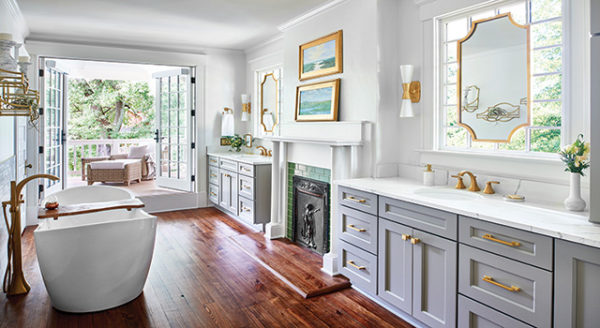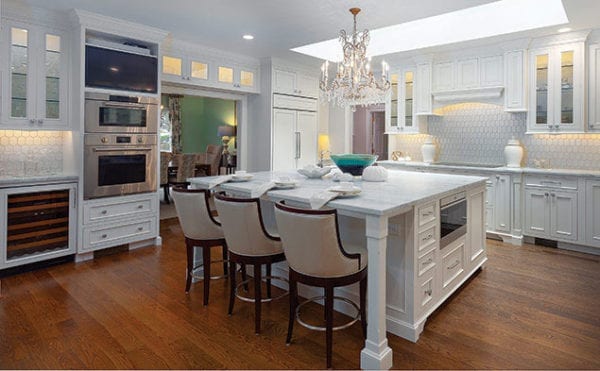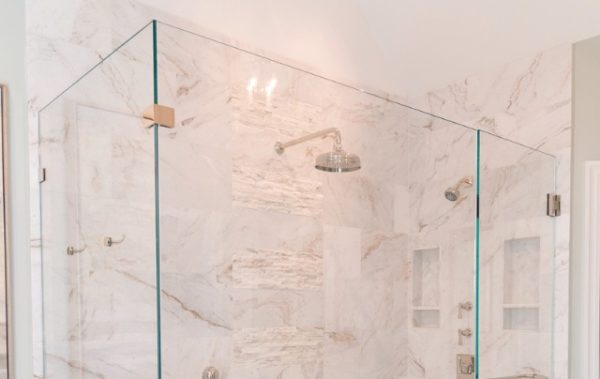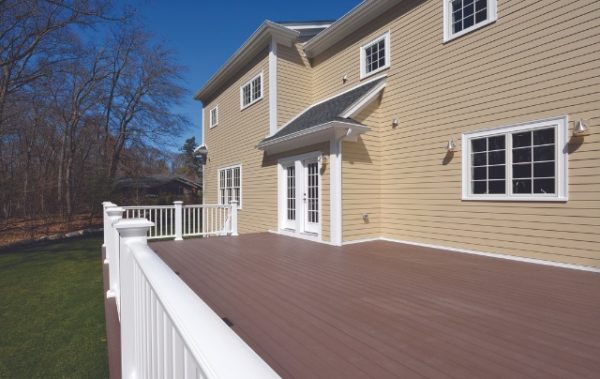War on Water

|
|
When you hear about water damage these days, your first thoughts are probably of the destruction caused by last years devastating hurricane season. The good news is that here in the Atlanta area we have little to worry about when it comes to major flooding. Unfortunately, there are lots of other ways for unwanted moisture to creep into your home, causing extensive damage and even health problems. In fact, moisture can be one of a homeowners greatest enemies. Knowing how to protect your home from water can save you thousands of dollars and plenty of time and energy.
 |
UP ON THE ROOFTOP
When searching for the source of a moisture problem, a good place to start is the top of the roof. Roof leaks are usually caused by improper flashing, says Keith Gipe, education coordinator for the Georgia Association of Home Inspectors. Flashing is a protective metal layer applied over joints and seams in a rooftop, and if its not installed correctly or hasnt aged well, leaks can occur. Loose or missing shingles and storm damage can also cause problems. If you do notice a leak and think its due to an unsealed roof, go ahead and call a professionalwithout repair, theres a good chance it will get worse over time.
Often overlooked, gutters can also be troublemakers. Gutters and downspouts actually cause tons of moisture issues, says Stan Garnet of Inspectors Associates Inc. Gutters should be designed to carry rainwater away from your home, but when theyre clogged with leaves and other debris, they no longer do their job. Instead, water may spill down the sides of your home, collecting around windows and doors and pooling at the foundation. This is one problem thats super easy to prevent. Maintenance, maintenance, maintenance, Garnet says. Clean out your gutters and downspouts regularly before a problem occurs.
Garnet offers another good piece of advice for keeping moisture from penetrating your homes exterior. Dont plant vegetation within 12 inches of outside walls, and dont let vines grow up walls, he says. That goes for all types of exteriors.
A SEALED ENVELOPE
Moisture is like an unwanted pest, finding all sorts of ways to creep into your home and cause damage. It can enter through any part of your homes envelope that isnt completely sealed, Gipe says. The envelope is basically your homes outer layer, the barrier between you and the elements. Leaks occur at the seams, like windows and doors, the roof and the foundation.
Leaky windows and doors generally result from improper installation or a home settling with age. Take a look at your windowsdo they look properly sealed? Its important to maintain the caulk around all the seams. Also, check your screens. If debris is present, such as leaves and dirt, moisture will build up between the screen and the windowsill. Clean this area often, particularly after windstorms or heavy rain.
Even newer homes are susceptible to problems. We just looked at a one-and-a-half-year-old house, and one of the windows was improperly sealed, so water had gotten down between the walls, Garnet says.
UNDERGROUND
Basements can be the most challenging areas of the home to keep dry. The first step is making sure your homes foundation is draining properlythis is important even for homes without basements. Too much water around the foundation (usually from storms) can cause major structural damage. Waterproofing companies, like AquaGuard in Marietta, can design custom drainage systems to ensure that water is flowing away from your home. These systems will help with erosion problems and can also prevent damage to your landscape. Just make sure the drains can be kept clear of debris.
Most homes are built on concrete slabs, and if not properly protected, water can migrate in through the slab. If your basement smells musty or feels damp, you can use a dehumidifier to help clear the air, but a more permanent solution will be necessary. AquaGuard can help you waterproof your basement with sub-floor waterproofing. If you plan to finish your basement, have it waterproofed and dried out first, and even then, make sure to use plastic under any flooring thats installed.
Crawl spaces are another huge source of moisture in the home. Make sure dirt floors are covered with thick, heavy plastic (preferably 6 millimeters), with all seams sealed. If you find that your crawl space becomes excessively wet when it rains, have drains installed.
UNDOING THE DAMAGE
Water can cause a lot of damage, including wood decay, permanently damp drywall, structural damage, and ruined finishes and furniture. Of course, water also breeds another much-dreaded problemmold. Aside from the permanent damage mold can do to the structure of a home, it can also cause health issues like upper respiratory problems. Mold is actually all over the place, but as the levels rise, especially in a home, health problems get worse, Gipe says. How bad it is will depend on an individuals threshold for it. Its essential for your home and your family to treat moisture problems effectively.
When you spot mold, go ahead and clean it up. Feel free to use bleach on hard surfaces, such as tile, but avoid it on walls and other porous areasa dry cloth might be best. A lot of people assume bleach will fix the problem, but they have to remember that its mostly water, so theyre getting an area where moisture is a problem even wetter, Gipe says.
If mold keeps returning to the same spot and you cant identify the problem, or if you think it might be growing inside the walls, you might need to call for help. Find a company that specializes in both testing and remediationif they can tell right away that theres a problem, they can fix it without charging you for testing.
 |
ON THE INSIDE
Making sure your home is well-sealed on the outside is the biggest step in preventing moisture damage. Remember, though, how many potential leakers you have indoors, likes pipes, washers and air conditioning, not to mention steam from showers and the thick Georgia humidity thats impossible to ignore. Water leaking from broken pipes inside the home is usually easy to notice, and like roof leaks, should be repaired immediately, as the problem will only worsen over time.
During the warmer months, make sure to keep an eye on your air conditioner. Air conditioners can be a source of mold, Gipe says. If theyre not working properly, they can actually bring moisture into the home. So if you think your AC is malfunctioning, have it repaired immediately to prevent a damp house.
Regular humidity cannot be overlooked. Gipe recommends leaving your AC on at all times, even when youre awayjust adjust the temperature accordingly. Closed-up houses without the air conditioning on are like humidity traps, and they can be a breeding ground for mold, Gipe says. As for bathrooms, where moisture is inevitable, just take a few precautions. Turn the fan on when the shower is in use, make sure the seams around the fixtures are properly caulked, soak up splashes and puddles and hang wet washcloths and towels up to dry instead of leaving them in damp piles.
MAINTAINING DRYNESS
The best way to protect your home from damage is with regular maintenance and a watchful eye. If you arent sure what you should be looking for, consider hiring a home inspector to take a look at your house annually. An inspector can give you an overview of any issues with your home, including moisture problems. And because he will make no money on the repairs, he can give you an impartial review. The cost of the inspection, usually between $200-$400, may save you thousands by helping you prevent problems before they get out of hand.
Also, its good to know what your insurance covers. Most homeowners policies will cover leaks from roofs or pipes, but not from floodsyou need flood insurance for that. Most policies dont cover water damage from outside sources; they just cover problems that occur with the house itself, Gipe says. While some policies will cover damage caused by mold, they usually wont pay for the actual removal of the mold. The key is to read and understand your insurance policy.
Its impossible, of course, to keep every bit of moisture out of your home. But as long as you know where to look for problems and how to prevent them, youll be doing your homeand your healtha huge favor.
|
MOLD CONTROL Ventilate or use exhaust fans (vented to the outdoors) to remove moisture where it accumulates, particularly in bathrooms, kitchens and laundry areas. Clothes dryers should be vented to the outside. Repair water leaks promptly, and either dry out and clean or replace water-damaged materials. Materials that stay wet for more than 48 hours are likely to produce mold growth. Lowering humidity indoors helps prevent condensation problems. To lower humidity during humid weather, use air conditioners and dehumidifiers. Proper exterior wall insulation helps prevent condensation from forming inside during cold weather. Information provided by the American Industrial Hygiene Association |

Perennial Plant Association To Host Atlanta Symposium for Homeowners and Industry Professionals

It’s Luxury Design Week! Come out to Design ADAC…

Flooring/Rugs | Myers Carpet | Masters of Home Makeover

Award-Winning Kitchens, Baths, Interior Design and More

Atlanta’s NKBA Designs of Distinction 2019 Winners

100 Things to Know Before You Remodel

What’s the simplest way to upgrade your window treatments?








